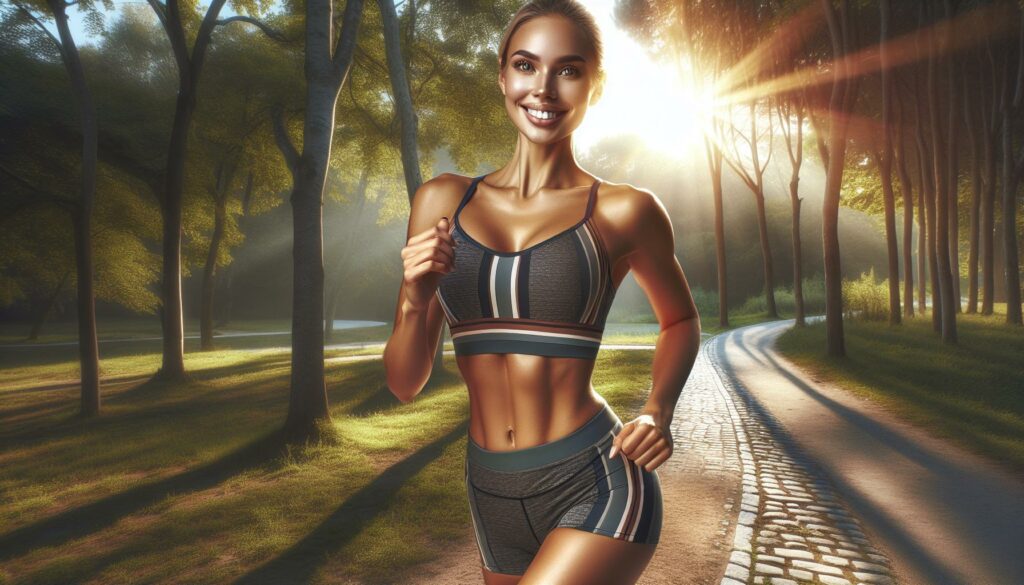”
I’ve always been fascinated by how images can capture the essence of physical health and wellness. From athletes in peak condition to everyday people embracing active lifestyles these pictures tell powerful stories about human potential and vitality.
As a fitness enthusiast and visual storyteller I’ve discovered that the right images of physical health can inspire motivate and educate. Whether it’s a perfectly timed photo of a runner crossing the finish line or a serene snapshot of someone practicing yoga these visuals communicate more than words ever could. They show us what’s possible when we commit to taking care of our bodies and remind us that physical health looks different for everyone.
Key Takeaways
- Pictures of physical health encompass diverse visual elements, from body composition and movement patterns to active lifestyle activities and wellness indicators.
- Key visual indicators of good physical health include proper posture, healthy skin complexion, balanced muscle development, and fluid movement patterns.
- Effective fitness photography requires specific camera settings (fast shutter speeds), consistent lighting conditions, and strategic angles to capture the essence of physical wellness.
- Progress documentation should maintain consistent parameters like timing, distance, angles, and lighting for reliable tracking of physical changes.
- Strategic placement of health-related images in daily environments can significantly boost motivation and reinforce fitness goals.
Pictures of Physical Health
Physical health manifests in diverse visual elements I’ve captured through my lens. Here’s how physical health appears in photographs:
Body Composition
- Defined muscle tone showing balanced proportions
- Healthy skin with natural glow
- Proper posture indicating core strength
- Balanced weight distribution across frame
- Clear facial features reflecting vitality
Movement Patterns
- Dynamic stretching sequences in action
- Functional movement during daily activities
- Athletic performance in various sports
- Balance exercises demonstrating stability
- Yoga poses showing flexibility
Visual Indicators of Wellness
| Indicator | Observable Features |
|---|---|
| Energy Level | Bright eyes active expression |
| Strength | Muscle definition muscle engagement |
| Flexibility | Full range of motion fluid movement |
| Balance | Stable posture coordinated actions |
| Vitality | Clear complexion alert demeanor |
Active Lifestyle Elements
- Morning running routines at sunrise
- Group fitness classes in progress
- Outdoor recreational activities
- Strength training sessions
- Recovery practices like meditation
- Well-equipped fitness spaces
- Natural outdoor training areas
- Home workout setups
- Athletic fields courts
- Recovery wellness spaces
Each image I capture tells a unique story of physical health through these visual elements working together to showcase optimal wellness in action.
Visual Indicators of Good Physical Health
Observable physical markers provide clear evidence of optimal health status through visual assessment.
Posture and Body Alignment
Proper alignment showcases balanced muscle development through a straight spine, level shoulders, and neutral head position. I observe these key postural indicators:
- Shoulders rolled back without forward rounding
- Head centered over shoulders, not jutting forward
- Natural S-curve in the lower spine
- Equal weight distribution between both feet
- Relaxed, aligned neck without tension
Skin and Complexion
Healthy skin reflects internal wellbeing through specific visible characteristics. I identify these primary skin health markers:
- Even skin tone without excessive redness or discoloration
- Natural moisture balance with minimal dry patches
- Clear complexion free from breakouts or inflammation
- Healthy color indicating proper circulation
- Subtle glow from regular exercise-induced blood flow
| Body Area | Positive Indicators | Signs of Imbalance |
|---|---|---|
| Posture | Aligned spine, level shoulders | Rounded shoulders, forward head |
| Skin | Even tone, natural moisture | Dryness, inflammation |
| Muscle | Balanced development | Asymmetry, atrophy |
| Movement | Fluid motion, stability | Restricted range, compensation |
| Face | Clear complexion, alertness | Dullness, dark circles |
Capturing Physical Fitness Through Photography
I focus on specific techniques to capture the essence of physical health through dynamic photography. These methods highlight both the aesthetic and functional aspects of fitness while creating compelling visual narratives.
Action and Movement Shots
Action photography freezes dynamic moments that showcase strength flexibility balance. I capture athletes during:
- Executing Olympic lifts (clean & jerk snatch)
- Performing bodyweight movements (muscle-ups handstands)
- Running sprints with perfect form
- Moving through yoga sequences
- Demonstrating sport-specific skills
The key elements I emphasize include:
- Fast shutter speeds (1/500 or higher)
- Multiple angles (front side 45-degree)
- Natural lighting conditions
- Raw unposed movements
- Peak moment timing
Before and After Transformations
Transformation photos document physical changes through consistent angles lighting poses. I implement these technical specifications:
| Photography Element | Before Shot | After Shot |
|---|---|---|
| Camera Distance | 6 feet | 6 feet |
| Lighting | Front-facing | Front-facing |
| Background | Solid neutral | Solid neutral |
| Time of Day | Morning | Morning |
| Poses | Front side back | Front side back |
- Identical clothing types
- Similar facial expressions
- Consistent stance width
- Equal camera height
- Matching room location
- Sequential timeline dates
- Standardized photo dimensions
Using Health Images for Motivation
Visual motivation transforms abstract health goals into tangible outcomes through strategic image placement. I’ve identified three key locations for positioning health-related images to maximize their motivational impact:
Strategic Image Placement
- Set inspirational photos as smartphone lock screens for 15+ daily view exposures
- Position workout progress pictures on bathroom mirrors for morning motivation
- Display athletic achievement images near home workout equipment for performance drive
Creating Vision Boards
Digital vision boards amplify Pictures of Physical Health motivation through curated image collections:
- Compile 10-15 goal-specific fitness photos
- Organize images by category: strength training performance strength endurance flexibility
- Update boards monthly with new milestone photos
- Include personal progress shots alongside aspirational images
Progress Documentation
Consistent photo documentation tracks physical changes effectively:
- Take weekly progress photos at identical times distances angles
- Capture 4 standard poses: front side back 45-degree angle
- Maintain consistent lighting clothing background
- Store images in dedicated digital folders labeled by date
Digital Integration
Modern platforms enhance motivation through visual content:
- Create Instagram albums with 20-30 curated fitness images
- Share progress milestones across fitness tracking apps
- Use Pinterest boards to collect workout demonstration photos
- Sync progress pictures with health monitoring applications
This structured approach to visual motivation creates multiple touchpoints throughout daily routines reinforcing health commitments through strategic image exposure.
Best Practices for Physical Health Photography
Camera Settings and Equipment
I optimize my camera settings with a shutter speed of 1/500 or faster to capture crisp action shots. A wide aperture (f/2.8-f/4) creates appealing background blur while maintaining subject sharpness. High-performance cameras produce superior results, though modern smartphones with portrait mode settings deliver quality fitness images.
Essential equipment includes:
- Full-frame camera with fast autofocus
- 24-70mm versatile zoom lens
- External flash for indoor environments
- Tripod for consistent progress photos
- Reflector for natural light modification
Lighting and Environment
Natural lighting provides optimal conditions between 7-9 AM or 4-6 PM (golden hours). Indoor photography requires:
- Large windows for diffused daylight
- Studio lights positioned at 45-degree angles
- Minimal shadows on subject’s face
- Clean neutral backgrounds
- Consistent lighting setup for progress shots
Composition Techniques
Key compositional elements enhance physical health photography:
- Rule of thirds placement for dynamic poses
- Leading lines highlighting body alignment
- Negative space around exercise movements
- Eye-level angles for form demonstration
- Multiple viewpoints of the same exercise
Subject Positioning
Proper positioning maximizes visual impact:
- 45-degree angle to camera for body shots
- Full extension of movements for range display
- Face visible during exercise execution
- Clear separation between limbs
- Neutral spine alignment in all poses
| Documentation Element | Specification |
|---|---|
| Photo Frequency | Every 4 weeks |
| Time of Day | Morning, fasted |
| Camera Distance | 6 feet from subject |
| Background | Solid white/grey |
| Poses | Front, side, back |
| Lighting | Consistent artificial |
These technical parameters ensure reliable progress tracking through consistent image capture conditions.
Physical Health
I firmly believe that pictures of physical health serve as powerful tools for inspiration documentation and education. Through my exploration of this visual medium I’ve discovered how these images can transform our understanding of wellness and fitness journeys.
Whether you’re capturing progress photos documenting athletic achievements or creating motivational visual content the key lies in consistency and technical precision. I’ve found that thoughtful photography combined with strategic placement of these images creates a powerful system for maintaining focus on health goals.
The visual story of physical health continues to evolve and I’m excited to see how new photography techniques and technologies will enhance our ability to capture and share these transformative moments.

